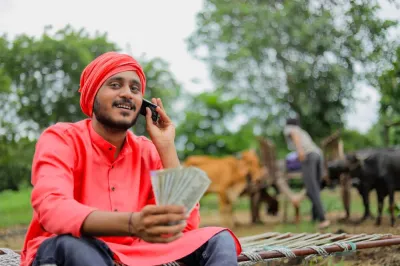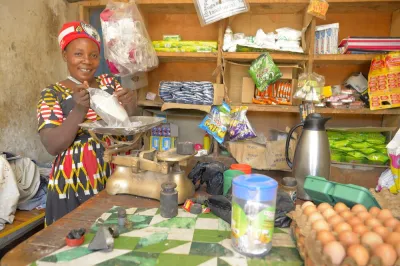Why We Need a Responsible Digital Finance Ecosystem

Eric Duflos leads CGAP’s work on consumer protection, from policy, industry and customer perspectives, ensuring that financial services have positive outcomes for customers. He has 28 years of experience in advancing financial inclusion and economic development. His most recent position, prior to returning to CGAP, was director of the office of the UNSGSA, H.M. Queen Máxima of the Netherlands, where he managed a team of staff and consultants working on fintech and digital finance policies and solutions for underserved segments.
FinDev Gateway: As the leading voice in responsible digital finance ecosystem research, CGAP has significantly shaped our understanding of consumer risks related to digital financial services (DFS). How has the concept of a “responsible digital finance ecosystem” emerged, and why is it necessary in today's digital era?
Eric Duflos: For over 15 years, CGAP has been actively advocating for consumer protection and responsible finance. Our journey began by addressing fundamental regulatory and supervisory aspects relating to consumer protection. As we progressed, we broadened our scope by collaborating with financial service providers and investors, collectively shaping the Responsible Finance Forum alongside partners.
Our 2022 research on the evolution of DFS consumer risks identified growing challenges for consumers. The Global Findex Database 2021 also uncovered concerning insights around potential users’ lack of trust in financial systems and existing users’ financial worry. And it is not only consumers who are facing issues, but also authorities who have to regulate and supervise a broader range of players involved in digital finance with more complex services.
A responsible digital finance ecosystem (RDFE) is necessary to address these evolving and growing risks. In essence, an RDFE ensures that financial services not only do no harm but also do good—i.e., treat consumers fairly and provide valuable tools that meet their needs – and that country-level authorities and other stakeholders can monitor these conditions. The concept of an RDFE has emerged from various previous initiatives led by CGAP and its partners and peers and aims to integrate these initiatives into a comprehensive framework.
Watch FinDev's interview with Eric Duflos:
New and evolving consumer risks for digital financial services
FinDev: You mentioned the evolving nature and scale of consumer risks in DFS. What types of risks are we talking about?
Eric: So far, we have identified 66 risks for consumers who use digital finance. For example, fraud and misuse of data are rising globally. The dynamic nature of financial technology has also given rise to new forms of risks, such as crypto-asset related risks, misuse of personal data and AI related risks.
We recently took a closer look at Cote d’Ivoire and Senegal and found that around 90 percent of surveyed DFS users say they have been exposed to risks such as fraud and poor network coverage. Over 30 percent in both countries said they have lost money as a result.
Rapid digitization of financial services, the arrival of many new types of providers, limited financial and digital literacy of consumers, and loopholes in regulatory and supervisory frameworks all contribute to this growth in risks for DFS consumers. These findings have convinced us that urgent action must be taken, and that we need to be more ambitious with our new approach to consumer protection.
Elements for building a responsible digital finance ecosystem
FinDev: So, to address these risks, we need a responsible digital finance ecosystem. How do we establish one?
Eric:
Customer-centricity, a key focus area for CGAP in recent years, is a fundamental element in ensuring effective consumer protection. It involves placing customers at the center of financial services, catering to their needs while safeguarding their interests. Both FSPs and regulators play crucial roles in adopting this approach for a successful RDFE. The RDFE approach also starts from an analysis of the exposure of consumers to DFS risks at the national level.
Also, all actors in an RDFE must have the appropriate capability to play a responsible role. For example, consumers need to be empowered with knowledge and incentives to make the right choices when using financial services. And management and staff within financial service providers should acquire skills that can help them serve their customers more effectively.
Finally, collaboration is essential as the key stakeholders must work together to identify areas where consumers may be at risk or where gaps exist in terms of protection and service provision. By fostering collaboration, the RDFE facilitates collective action to address these issues effectively.
While the 3 C’s may not present a complete solution, they can serve as a solid foundation. We are currently exploring what are some of the other key components needed for a RDFE.
Measuring success: Doing no harm and doing good
FinDev: The preliminary framework you've outlined sounds promising, but how do we go about implementing it and monitoring progress? Do you have any initial thoughts on what we need to measure and how?
Eric:
With that in mind, our approach always starts with a benchmark consumer demand survey initiated by the financial sector authorities to ensure the integration of the consumer voice throughout the process. Then, in collaboration with key stakeholders, we assist authorities in evaluating the overall situation, identifying gaps and formulating an action plan.
To measure progress, we need to assess whether DFS are successful in a) doing no harm and b) doing good, i.e. treating their customers fairly and providing them with services that are useful for them and meet their initial purpose. We are still developing these measurement tools, but they include national surveys that measure consumers’ exposure to risks as well as analyses of customer satisfaction levels.
We are starting to use this approach in the WAEMU region in Senegal, Cote d’Ivoire and Burkina Faso, where we are supporting local authorities to develop a more responsible digital finance ecosystem. This initial experience will feed into the elaboration of a methodology to foster RDFEs.
An open invitation for co-creation
FinDev: What are CGAP's aspirations regarding the work on the responsible digital finance ecosystem?
Eric: CGAP is currently in the process of engaging in consultations with global and national stakeholders to collaboratively define the components of the ideal RDFE. We extend an invitation to everyone reading this to join us in this endeavor, as we believe in an inclusive and open-door approach. Our aim is to co-design and co-create an RDFE framework that is both ambitious yet grounded in reality to ensure feasibility. We will be paying close attention to the specific situations and needs of women, recognizing the importance of addressing gender inequity in financial inclusion.
Ultimately, because context matters, our project aims to develop a modular and adaptable methodology that empowers local authorities to foster a more responsible digital finance ecosystem. This methodology will provide guidance on various aspects, including assessments, roadmap development, creating incentives, and enabling measurement.
Related Content
This interview was conducted as part of our media partnership for the Responsible Finance Forum organized by the Center for Financial inclusion. For additional content related to this conference, please see below:
-
A Chatbot Named BOB and Other Consumer Protection Measures in the Philippines, FinDev Interview with Atty. Charina B. De Vera-Yap of the Central Bank of the Philippines
-
Financial Inclusion and Climate Action: An Emerging Policy and Advocacy Agenda, FinDev Interview with Peter McConaghy of UNSGSA



To think that all this started in the early 2000s with migrants to Nairobi sending money to their families in their home villages by sending phone minutes that could be cashed in. Digital lending is the worst offender. Usurious interest rates as it undermines the collective community based traditional saving and lending system. I applaud CGAP's efforts to focus on protecting the consumer
Leave a comment